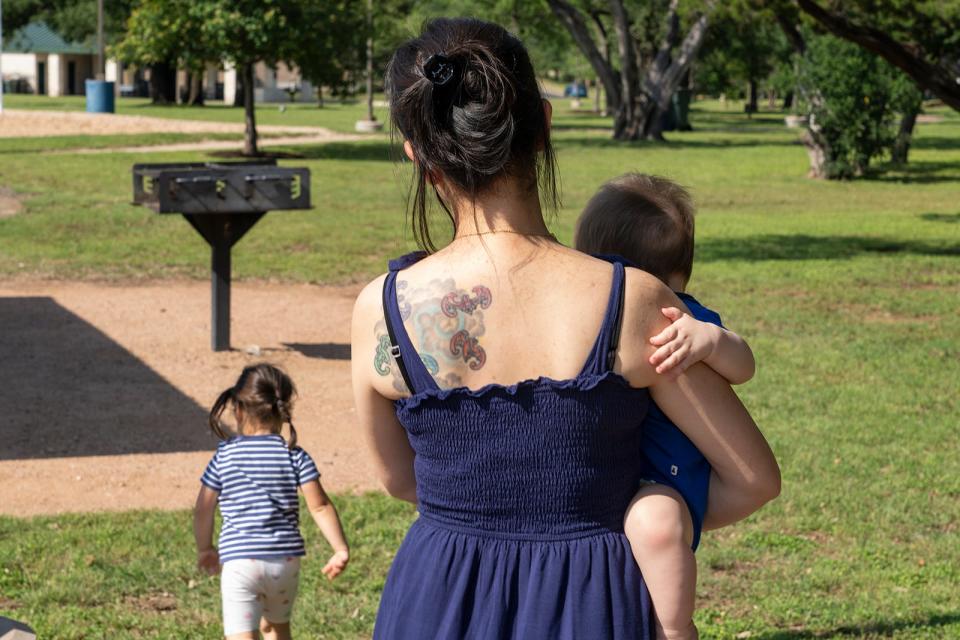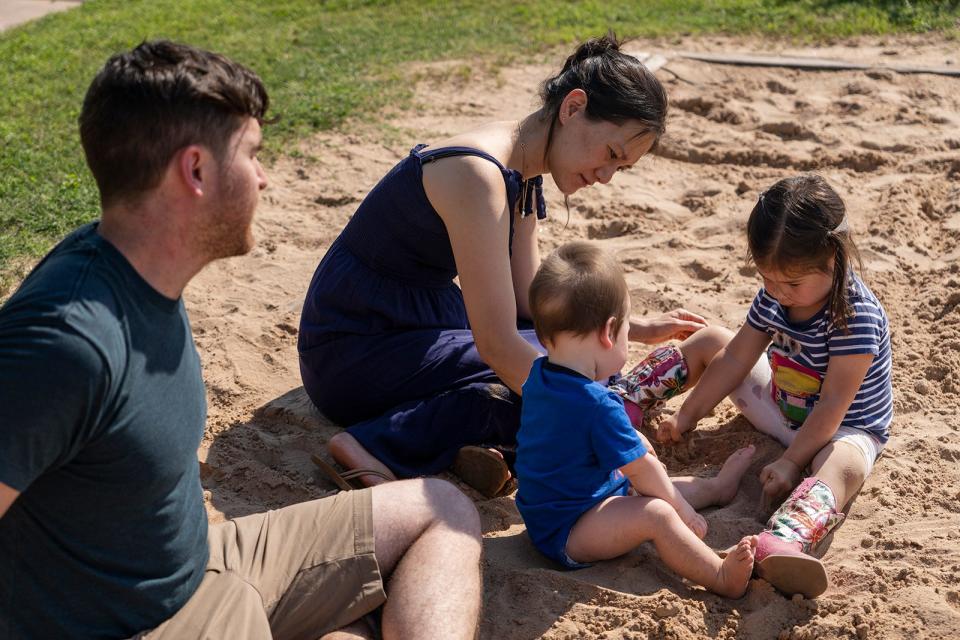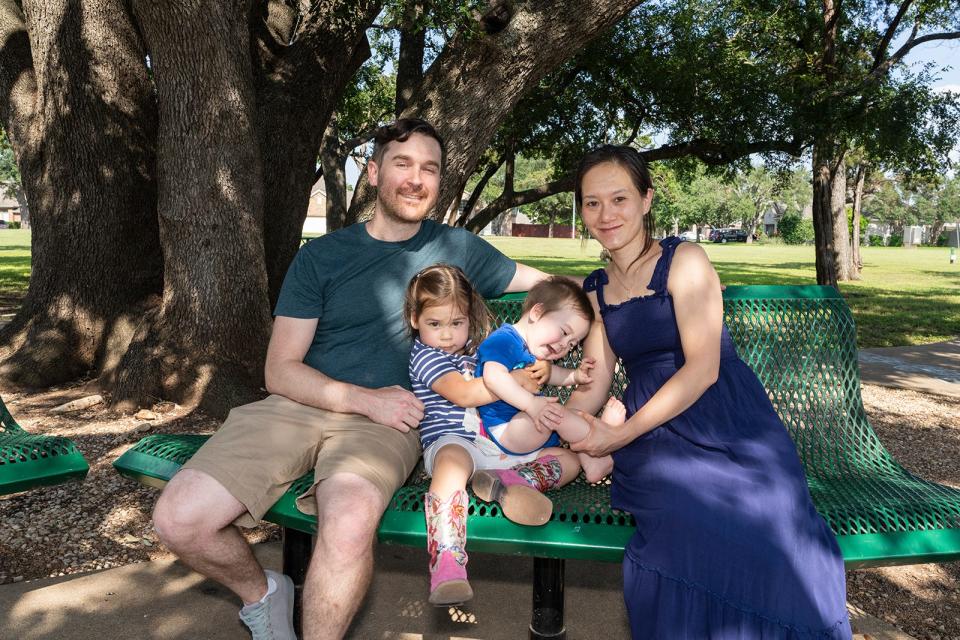Mom's heart murmur turns into risk for heart failure after pregnancy
Milly Lee, 37, didn't take her primary care doctor's advice. The Round Rock mom was busy raising a toddler when at her annual checkup in 2021, her primary care doctor told her she needed to see a cardiologist about that heart murmur she had had since college.
She got pregnant with her second baby shortly after that doctor's visit. "We'll deal with this after the pregnancy," she said she remembered thinking. After all, she was going to be seeing her obstetrician at least monthly for the next nine months.
"I'm usually a really good patient, but we had so much going on," Lee said. Because her murmur had not bothered her, "What would be the harm in not dealing with it until after I'm done with pregnancies?" she remembers thinking.
A murmur is an extra sound between heartbeats that is caused by blood flowing roughly through the heart valves. Sometimes a murmur is nothing to worry about; other times it's a sign of something more serious.
Pregnancy and giving birth can amplify existing heart conditions and create new ones. More and more doctors are watching for heart complications before, during and after pregnancies.

There's something about pregnancy and the heart
Dr. Faraz Kerendi of Cardiothoracic and Vascular Surgeons, who was Lee's surgeon, said the fluid retention that happens during pregnancy can cause murmurs to become more apparent. The body goes through a lot of changes during pregnancy that affect the heart, Kerendi said. Hormonal changes, increased blood flow and more fluid all play a factor. Blood pressure can rise, which makes valves more likely to leak or a leak to worse, he said.
Kerendi recently has had three women who were pregnant or had just given birth who needed heart surgery for various reasons related to the impact of the pregnancy.
Cardiovascular disease is responsible for 33% of pregnancy-related maternal deaths, the largest single reason, according to multiple studies sited in the journal Global Cardiology Science and Practice. It's estimated that 68% of pregnancy-related deaths caused by cardiovascular conditions are preventable, the journal states.
"In the cardiac world, we only see pregnancy as a vehicle for disaster," said Dr. William Kessler, surgical director of cardiac transplantation at Ascension Seton Medical Center. He points to incidents of blood clots and amniotic clots during delivery as well as postpartum cardio myopathy (heart failure after having a baby) and postpartum coronary artery dissection (a tear in the artery wall).
Heart scares: Cedar Park mom has heart attack minutes after delivering twins via C-section — and survives

A murmur turns into a roar
Lee felt like her second pregnancy was similar to the first one, except maybe she had a little shortness of breath. She attributed that to her growing baby pushing up against her lungs.
Throughout her pregnancy and Arthur's birth on July 17, whenever a doctor would listen to her heart, they often would call over a new doctor in training to come listen, too: "You want to hear a heart murmur? Here is a classic one."
Then something changed. When Arthur was 10 weeks old, Lee was feeling a lot of chest pressure, mostly at night. It was becoming hard to breathe. She could feel her heart beating in her chest very strongly, and she developed a cough.
She returned to that same primary care doctor Oct. 10, and he took a listen to her heart again.
"He was a little upset at me," Lee said. She remembers him asking, "You didn't go see a cardiologist, did you?"
Then he told her: "You need to see a cardiologist tomorrow. I'm going to make an appointment for you."
"He sounded pretty serious," Lee said.
The next day, an echocardiogram at the cardiologist's office revealed her mitral valve had prolapsed and blood was pooling backwards. It was causing strain on the heart, and she was starting to get an enlarged heart.
In the long term, her heart could become weak, and she could go into heart failure.
Lee needed to have her mitral valve repaired, which Kerendi said is unusual in a patient this young.
"It was definitely a surprise and very scary," said husband Evan Eppinger. "There's the potential it could just be me and them," he said, looking at his children.
Lee said, "I told him not to Google it."
The couple has been together since 2008 when they met at Texas A&M University. They now work together as real estate agents.
For Lee, the pregnancy probably played a role in her murmur getting worse and the mitral valve needing to be repaired. It did not yet have to be replaced. This gave Kerendi the option of doing minimally invasive surgery.
Easier surgeries: Never too old: 105-year-old Taylor man now has normal life after heart valve replacement

Repairing the heart valve
On Jan. 25, Kerendi cut a small incision between the ribs under Lee's left breast. Then he put Lee on a heart-lung bypass machine to circulate the blood and oxygen while the heart is stopped. Inside the mitral valve, he repaired some of the valve's chords with sutures and then placed a ring around the valve to reinforce the valve. The valve could then open and close properly.
Lee's repaired valve could last 20 years or more, but sometimes, it's less than that. Ultimately, the valve might need replacing because these repairs are usually not done in someone as young as Lee.
Lee should be on the lookout for many of the same symptoms she experienced before: shortness of breath, tightness in the chest, heart palpitations, as well as fluid retention, swelling or dizziness.
Lee was able to return to normal activity after two weeks with the repair. "It was hard to keep her not involved," Eppinger said. "She was wanting to pick up the baby."
Traditional open-heart surgery would have required six to eight weeks of recovery, Kerendi said.
Now when people listen to Lee's heart, it sounds normal. There is no murmur.
Lee is able to chase 3-year-old daughter Tori around the neighborhood playground and pick up both kids.
The biggest lesson she learned is the importance of her health. "I, like many women and mothers, have a hard time prioritizing things for myself," she said. "It didn't seem especially important to see a cardiologist then because I didn't have any symptoms like I ended up developing postpartum."
Heart dangers: A spirit of gratitude: Austin mom shares journey from childbirth to heart transplant
This article originally appeared on Austin American-Statesman: Pregnancy increases risks for heart problems

